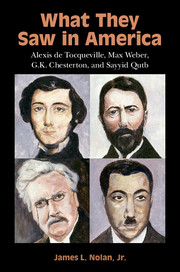Book contents
- Frontmatter
- Dedication
- Contents
- Acknowledgments
- Introduction
- 1 Pride, Patriotism, and the Mercantilist Spirit: Tocqueville and Beaumont Discover America
- 2 Tocqueville and the Quandary of American Democracy
- 3 Agrarianism, Race, and the End of Romanticism: Weber in Early Twentieth-Century America
- 4 Weber on Sects, Schools, and the Spirit of Capitalism
- 5 A New Martin Chuzzlewit: Chesterton on Main Street
- 6 Chestertonian Distributism and the Democratic Ideal
- 7 From Musha to New York: Qutb Encounters American Jahiliyya
- 8 Qutb's “Inquiring Eyes” in Colorado and California
- Conclusion
- Notes
- References
- Index
7 - From Musha to New York: Qutb Encounters American Jahiliyya
Published online by Cambridge University Press: 05 April 2016
- Frontmatter
- Dedication
- Contents
- Acknowledgments
- Introduction
- 1 Pride, Patriotism, and the Mercantilist Spirit: Tocqueville and Beaumont Discover America
- 2 Tocqueville and the Quandary of American Democracy
- 3 Agrarianism, Race, and the End of Romanticism: Weber in Early Twentieth-Century America
- 4 Weber on Sects, Schools, and the Spirit of Capitalism
- 5 A New Martin Chuzzlewit: Chesterton on Main Street
- 6 Chestertonian Distributism and the Democratic Ideal
- 7 From Musha to New York: Qutb Encounters American Jahiliyya
- 8 Qutb's “Inquiring Eyes” in Colorado and California
- Conclusion
- Notes
- References
- Index
Summary
The Egyptian Sayyid Qutb boarded a ship in Alexandria headed for the United States on November 3, 1948. It was the first time the forty-two-year-old Qutb had ever traveled outside of Egypt. Qutb would spend almost two years in the United States. The reasons for his trip to America were not unlike those that determined Tocqueville's journey nearly 120 years earlier. Like Tocqueville, Qutb worked for the government, in this case for the Egyptian Ministry of Education. Also like Tocqueville, Qutb's political position in his home country had become precarious and a trip abroad was contrived to extricate him from an increasingly tenuous situation, in fact, to avoid an arrest warrant that had been issued by the Egyptian government. Just as Tocqueville was commissioned to study American prisons, Qutb was commissioned to “investigate the American system of education, its methods and curricula.”
In Qutb's case, however, the government initiated the trip and the reason wasn't so much because of changing political circumstances as it was because of Qutb's writings, which were increasingly viewed as problematic by the Egyptian government. For the first part of Qutb's career, he had been a fairly prominent member of the secular intellectual class in Cairo. He was a well-known poet, essayist, literary critic, and educator. In the 1940s, however, Qutb was transitioning from a modern secularist into an Islamic activist and was becoming more vocal in his criticisms of Western influence in Egypt and of complicity, political corruption, and tyranny in the existing regime of King Farouk I. Aided by the intervening efforts of Prime Minister Mahmoud Nuqrashi Pasha, Qutb's trip was arranged with the hope that time in the United States would moderate his hostile attitude toward the West. It did just the opposite. His two years in America served to further radicalize Qutb and harden his views toward the West in general and toward the United States in particular.
There is some debate about whether Qutb's time in America caused his radical turn or simply confirmed opinions he had already formed. Arguing for the former, historian Emmanuel Sivan sees Qutb's time in the United States as “the formative experience that converted him to fundamentalism.”
- Type
- Chapter
- Information
- What They Saw in AmericaAlexis de Tocqueville, Max Weber, G. K. Chesterton, and Sayyid Qutb, pp. 163 - 182Publisher: Cambridge University PressPrint publication year: 2016



